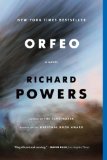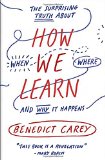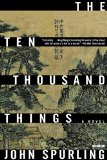Summary | Excerpt | Reading Guide | Reviews | Beyond the book | Read-Alikes | Genres & Themes | Author Bio

In an age of increasing paranoia, what does hell look like? What happens when an unsuspecting victim gets trapped in its recesses? In a pitch-perfect retelling of the myth of Orpheus, Richard Powers reflects on the life of an everyman, Peter Els, as he is inadvertently pulled into a maelstrom of events beyond his control. In the process, Powers paints a deeply affecting look at a life filled with regret and loss - yet one lived with measured grace.
As Orfeo opens, seventy-year-old Peter Els places a 9-1-1 call in an act of desperation, hoping it might save his dying dog's life. The officers who respond think it's weird enough that this retired professor of music composition called emergency services for a pet, but what really gets their attention is a whole range of laboratory equipment — beakers, reagents and such — strewn around the house. As it happens, Peter is fascinated by the mysteries of genetics and this home lab is his conduit to the many wonders it holds. However, in a post 9-11 era, such "hobbies" are increasingly suspect, and soon the federal authorities are hot on Peter's heels. Not quite clear what his options are, Peter flees and in doing so, traces the mythic Orpheus journey through a different kind of "hell" as he tries to reconnect with the people he loves, including his ex-wife, Maddy, and their daughter, Sara.
Powers follows the spirit of the Orfeo opera not just in story but also in form. For example, just as the opera is an exercise in polyphony, where two or more simultaneous lines of melody exist together, the novel, too, tracks two parallel storylines. The first is set in the present with the chase and the second traces the arc of Peter Els' life — from his early teens to his retirement. The gifted Peter had a way with both science and music and Powers shows how he takes the music path, leaving his love for chemistry simmering in the background. The demands of an art career strain his marriage, and frustration at not being able to produce anything meaningful makes things doubly worse. "How small a thought it takes to fill a whole life," Peter reflects later. That thought — to "write music that would twist your gut" — definitely consumes Peter's life at the cost of all else. Interrupting these two storylines is a series of staccato bursts of "composition," that read like tweets from Peter Els. These interruptions feel a tad gimmicky at times (mainly because they distract from the pace, at least initially) but as the story reaches its crescendo, the three elements come together seamlessly.
There are plenty of touches of humor (bordering on satire) as well. For example, Peter remembers his mother's "gappy one-piece suit with the little skirt" as one that made her look like a "Ponchielli hippo ballerina." Powers doesn't lose a chance to point fingers at our contemporary media outlets, which will do practically anything to feed the 24-7 news machine. In short order Peter Els is labeled "Biohacker Bach" and every small bacterial contamination incident around the country is immediately linked to him. The incessant news reports and witch hunt that follow create their own version of the "hell" that Peter must navigate to find the peace he so desperately seeks.
Richard Powers won the National Book Award for The Echo Maker, a novel that is on my "what to bring if I am stranded on a deserted island" list. That incredible work showed just what magic can be achieved by melding science and art together — the story is centered on a young man who sustains severe neurological problems after a road accident. Here too, Powers fuses science (genetics) and art (music) together. Peter Els is comfortable doing both — he sees music in science and science in music. When Peter looks at a single cell, he is blown away by the "astonishing synchronized sequences, plays of notes that made the Mass in B minor sound like a jump-rope jungle."
In a sense, Peter is probably much like Powers himself — someone who doesn't view art and science as opposing forces in the war of "two cultures," but who has instead made a reputation by basing his art on scientific ideas. "I'm just lucky in being shaped to feel the drama and narrative in the scientific approach to the world. Mathematics and genetics and information theory seem to be domains of great passion and anxiety, filled with all kinds of hope and joy, which is the basic stuff of all human stories," Powers has said.
In Orfeo, Powers takes this "basic stuff of all human stories" — love, loss, ambition, fear — and crafts one heck of a powerful narrative. Through his writing, Powers shows us that science and art are both part of one continuous spectrum of life experiences. The result is sheer harmony. Orfeo is a soaring and soulful performance and reaffirms Powers' place as one of our most gifted contemporary novelists.
"Life turned out to be one shot, stray and mistaken, a single burst scattered on the air," Peter Els reflects in Orfeo. Even just that one line captures wave upon wave of heartache, loneliness, and profound regret. It delivers a sense of immediacy and empathy that only truly great fiction can.
![]() This review was originally published in The BookBrowse Review in January 2014, and has been updated for the
September 2014 edition.
Click here to go to this issue.
This review was originally published in The BookBrowse Review in January 2014, and has been updated for the
September 2014 edition.
Click here to go to this issue.

If you liked Orfeo, try these:

by Benedict Carey
Published 2015
In the tradition of The Power of Habit and Thinking, Fast and Slow comes a practical, playful, and endlessly fascinating guide to what we really know about learning and memory today—and how we can apply it to our own lives.

by John Spurling
Published 2015
A novel of fated meetings, grand battles, and riveting drama, and in its seamless fusion of the epic and the intimate, it achieves a truly singular beauty that deserves to be compared to the classic Chinese novels that inspired it.
Your guide toexceptional books
BookBrowse seeks out and recommends the best in contemporary fiction and nonfiction—books that not only engage and entertain but also deepen our understanding of ourselves and the world around us.